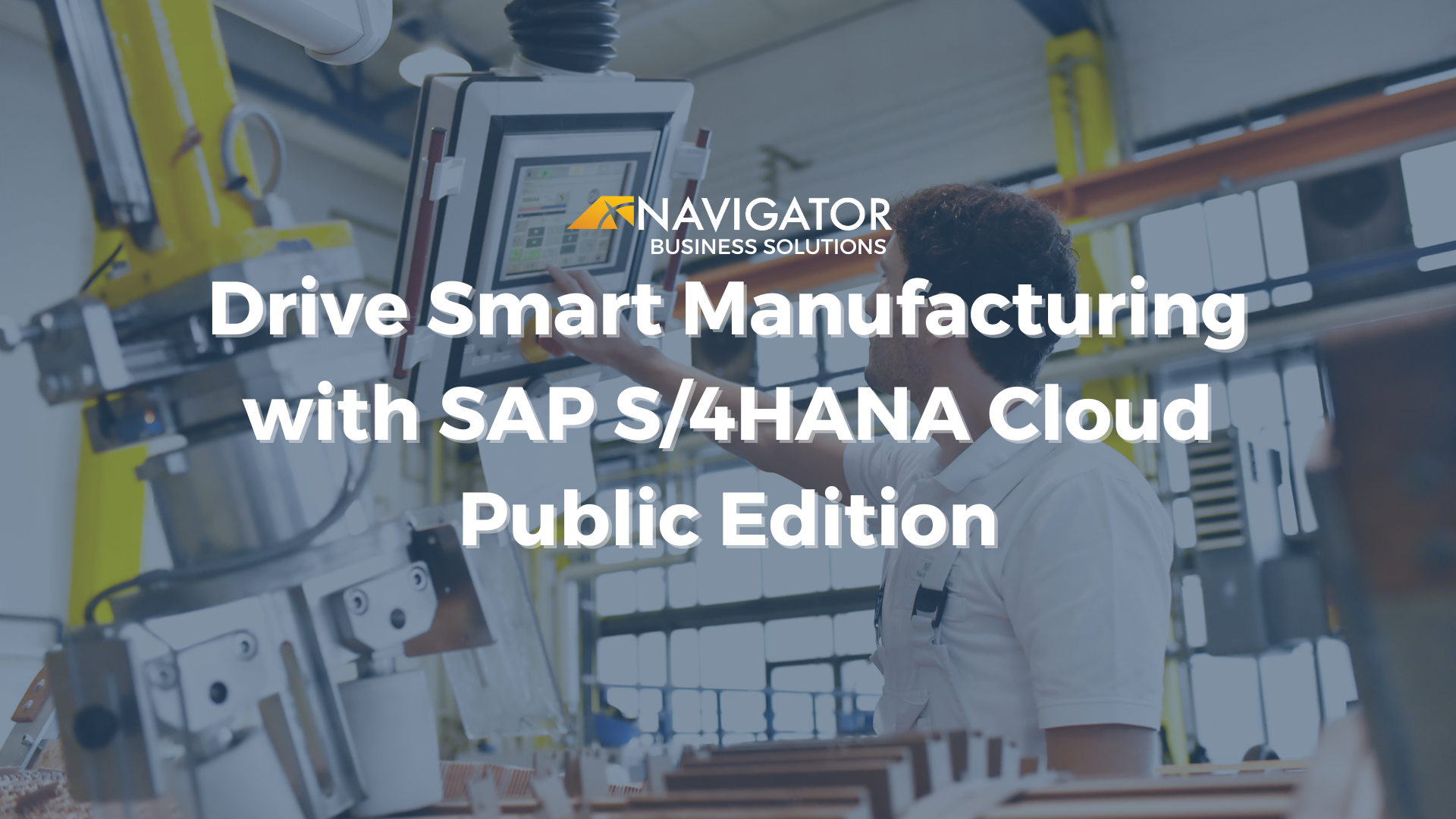
Drive Smart Manufacturing with SAP S/4HANA Cloud Public Edition
Manufacturers are buffeted by a range of challenges today. From supply chain issues and the rising cost of raw inputs to labor shortages and technological change, there are many issues to keep management up at night. But smart manufacturing and core enabling technologies such as SAP S/4HANA Cloud Public Edition can help.
The mood among manufacturers is not good overall. One in three manufacturing executives is concerned about the health of their business right now, according to data from the National Association of Manufacturers’ Q3 2023 Manufacturers’ Outlook Survey. This is the lowest confidence rating in the industry in the last three years.
Three of the biggest factors driving this concern are labor constraints, the cost of raw materials, and supply chain challenges. Manufacturers are struggling with hiring and retaining workers, and will need to fill an estimated 4 million jobs by 2030, according to data from the Manufacturing Institute and Deloitte Consulting; it is estimated there could be a shortfall of roughly 2.1 million jobs unfilled.
At the same time, supply chain issues continue to press on roughly 37.8 percent of manufacturers according to the Manufacturers’ Outlook Survey. Almost three-quarters of manufacturing executives cite raw material costs as their primary supply chain concern.
The solution for these challenges and many of the other concerns that manufacturers face is digital transformation. Roughly 86 percent of manufacturing executives surveyed by Deloitte indicate that technology and smart manufacturing solutions are the way forward for competitiveness over the next five years.
This digital transformation and the move toward smart manufacturing starts with having a modern enterprise resource planning solution (ERP) in place.
The Benefits of Smart Manufacturing with Cloud ERP
Having the right backend system in place enables better visibility and deeper levels of automation and coordination for manufacturers.
While most manufacturers already have some form of ERP in place, a modern, cloud-based ERP system helps a manufacturer better harness data, analyze it with artificial intelligence, and integrate core processes with supplier systems for tighter supply chain management and cost controls. Smart manufacturing is using today’s digital technology for more intelligent operations.
Some of the benefits that come from smart manufacturing and the use of a modern, cloud-based ERP solution include:
Supply Chain Optimization. Manufacturers have real-time visibility and control over their entire supply chain, from raw materials to finished goods. A manufacturer is empowered to optimize inventory levels, improve supplier collaboration, and ensure on-time delivery, all the while reducing costs and environmental impact.
Predictive Maintenance. Smart manufacturing leverages machine learning capabilities to predict equipment failures before they occur. This minimizes downtime, maximizes production efficiency, and extends the lifespan of a manufacturer’s assets.
Advanced Quality Management. With a modern ERP system in place, manufacturers can ensure consistent product quality with built-in quality control measures and real-time data on production processes. This reduces waste and product recalls, boosting customer satisfaction and increasing brand reputation.
Improved Workforce Management. Smart manufacturing empowers employee efficiency and morale with real-time data and mobile access to critical information. This enhances collaboration, optimizes scheduling, and fosters a culture of continuous improvement.
Why Manufacturers Should Use SAP S/4HANA Cloud Public Edition
As the ERP market leader, SAP is well aware of the challenges and trends in the manufacturing space. As a result, SAP has re-engineered its ERP solutions for the dynamics of the manufacturing industry today, including enhanced integration and better data analytics for smart manufacturing. Since ERP rollout is a considerable project, SAP also has leveraged the cloud and a new modular architecture so manufacturers can relatively quickly roll out their system and easily adjust as business dynamics change.
SAP S/4HANA Cloud Public Edition is a cornerstone of this re-engineered approach. It is SAP’s flagship ERP solution hosted and managed by SAP for reduced cost and complexity. With S/4HANA Cloud Public Edition, a manufacturer gets an intelligent, cloud-based ERP that optimizes manufacturing processes, increases agility and improves product and service quality.
At the same time, S/4HANA Cloud is a ready-to-run, fit-to-standard cloud ERP solution that delivers the latest industry best practices and continuous innovation.
Manufacturers also can extend and customize S/4HANA Cloud Public Edition for their specific needs through the SAP Business Technology Platform (BTP), an online marketplace that makes integration and customization easier.
Through the BTP, manufacturers tap into the power of the SAP Integration Suite, an integration platform-as-a-service (iPaaS) for connecting and automating business processes with pre-built integrations, APIs, connectors, and best practices. This integration suite comes with 750+ pre-built integrations to S/4HANA Cloud Public Edition and 700+ pre-built, open APIs.
With S/4HANA Cloud Public Edition, manufacturers can quickly make the jump to smart manufacturing and put in place a system that will continue to grow and evolve as business dynamics change. By running a manufacturing operation with S/4HANA Cloud Public Edition, a business not only digitally transforms, it also future-proofs operations.
Learn more about SAP S/4HANA Cloud Public Edition for manufacturing, or contact one of our experienced ERP consultants at (801) 642-0123 for more on how SAP can digitally transform your business.

